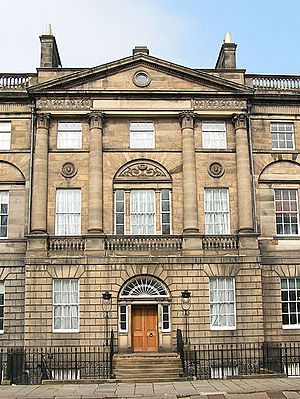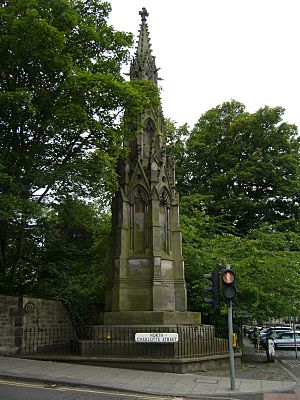Catherine Sinclair facts for kids

Catherine Sinclair (born 17 April 1800 – died 6 August 1864) was a Scottish writer. She wrote many novels, including special books for children. Her children's books were different from others at the time. They were fun and imaginative, not just lessons on how to behave. Catherine is also known for figuring out that Sir Walter Scott was the secret author of the famous Waverley Novels.
Contents
Catherine Sinclair's Early Life
Catherine Sinclair was born in Edinburgh, Scotland, on 17 April 1800. Her family lived in a beautiful area called Charlotte Square. She was the fourth daughter of Lady Diana Macdonald and Sir John Sinclair, 1st Baronet.
From the age of 14, Catherine worked as her father's secretary. She helped him until he passed away in 1835. For a few years, she also lived in Ham, London, at a place called Ormeley Lodge.
Becoming a Children's Author
After her father's death, Catherine started writing her own books. She was especially interested in writing for children. Her nephew, George Boyle, inspired her to create stories.
One of her most famous books is Holiday House, A Book for the Young. This story was about two playful children. It was very popular because it was different. Most children's books then tried to teach moral lessons. But Catherine's book was full of fun and imagination. It even included tales of fairies and giants!
Catherine once wrote about storytelling:
"We never forget those who good humouredly complied with the constantly recurring petition of all young people... — 'Will you tell us a story?'"
This shows how much she loved telling stories to young people.
Helping Her Community
Catherine Sinclair was also very active in helping people in Edinburgh. She started cooking places for those in need. She also supported a mission station at the Water of Leith.
She worked to get seats placed in busy streets. She also helped set up public drinking fountains in Edinburgh. One fountain even had her name on it. It was a great example for other cities.
Catherine is also remembered for discovering a big secret. She found out that Sir Walter Scott was the author of the "Waverley Novels." These popular books were first published without an author's name.
Later Life and Legacy
Catherine Sinclair passed away on 6 August 1864. She died at her brother's home in Kensington. She was buried in Edinburgh at St John's Episcopal Church. Catherine never married.
Her Brothers
Catherine had three brothers who were also well-known. They were Sir George Sinclair, 2nd Baronet, John Sinclair, and William Sinclair.
Remembering Catherine Sinclair
A special monument was built to honor Catherine Sinclair. It stands in Edinburgh's New Town, near where she grew up. The monument was designed by David Bryce and sculpted by John Rhind. It looks a bit like the famous Scott Monument, which Catherine had helped fund.
The monument has a message carved into it: "She was a friend of all children and through her book 'Holiday House' speaks to them still." This shows how much she meant to young readers.
Catherine Sinclair's Books
Catherine Sinclair wrote in a bright and witty way. She was good at creating interesting characters and descriptions. Many of her books were popular even in America.
Some of her early and famous works include:
- Holiday House: A Book for the Young (written in 1839)
- Modern Accomplishments, or the March of Intellect, a study of female education, 1836
- Modern Society; or, The March of Intellect. The Conclusion of Modern Accomplishments, 1837
- Hill and Valley; or, Hours in England and Wales, 1838
- Shetland and the Shetlanders, or the Northern Circuit, 1840
- Scotland and the Scotch, or the Western Circuit, 1840
- Modern Flirtations, or a Month at Harrowgate, 1841
- Jane Bouverie, or Prosperity and Adversity, 1846
- The Journey of Life, 1847
- The Business of Life, 1848
- Sir Edward Graham, or Railway Speculators, 1849
- Lord and Lady Harcourt, or Country Hospitalities, 1850
- The Kaleidoscope, or Anecdotes and Aphorisms, 1851
- Beatrice, or the Unknown Relatives, 1852
- Popish Legends, or Bible Truths, 1852
- London Homes, 1853
- Cross Purposes, 1853
- The Cabman's Holiday, 1855
- Torchester Abbey, 1857
- Anecdotes of the Cæsars, 1858
- Sketches and Short Stories of Scotland and the Scotch, and Shetland and the Shetlanders, 1859
- Sketches and Short Stories of Wales and the Welsh, 1860
Images for kids
 | Sharif Bey |
 | Hale Woodruff |
 | Richmond Barthé |
 | Purvis Young |




